Analysis of Pedagogy and Practice in Level 7 Education (Laptop04011)
VerifiedAdded on 2022/08/24
|17
|5831
|38
Report
AI Summary
This report delves into the intricacies of pedagogy and practice within an educational setting, focusing on Level 7 education. It begins by defining pedagogy and its influence on teaching, learning, and assessment approaches. The report then analyzes various pedagogical methods, including constructivism, collaborative learning, inquiry-based learning, integrative approaches, and reflective practices, evaluating their potential within a management subject area. It further explores the relationship between policy, practice, and theory, examining how inquiry extends the understanding of pedagogy. The report culminates in a discussion of applying pedagogic theory and practice, emphasizing the importance of improving professional practices through observation, reflection, and self-evaluation. The analysis provides insights into effective teaching strategies and the continuous improvement of educational methods.
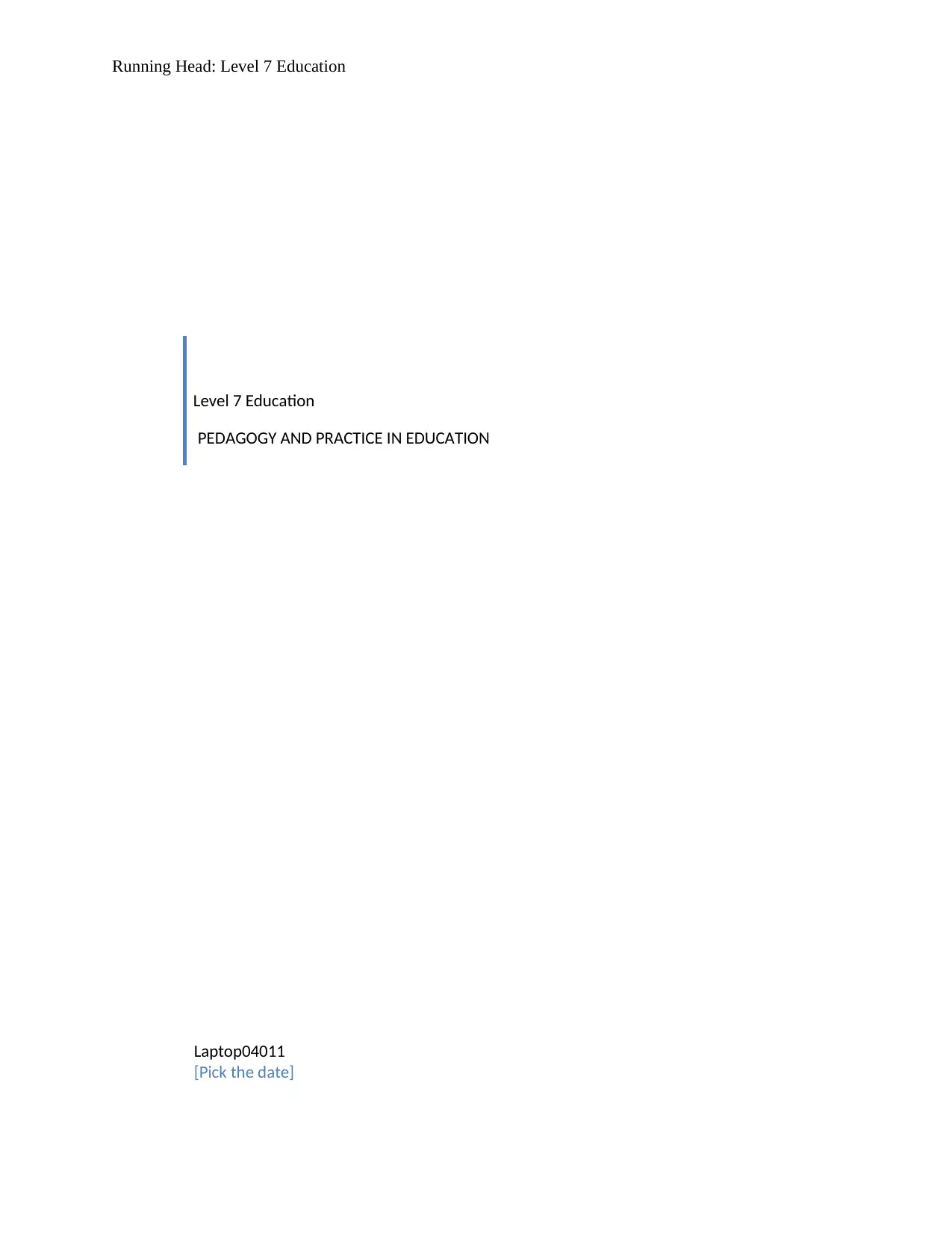
Running Head: Level 7 Education
Level 7 Education
PEDAGOGY AND PRACTICE IN EDUCATION
Laptop04011
[Pick the date]
Level 7 Education
PEDAGOGY AND PRACTICE IN EDUCATION
Laptop04011
[Pick the date]
Paraphrase This Document
Need a fresh take? Get an instant paraphrase of this document with our AI Paraphraser
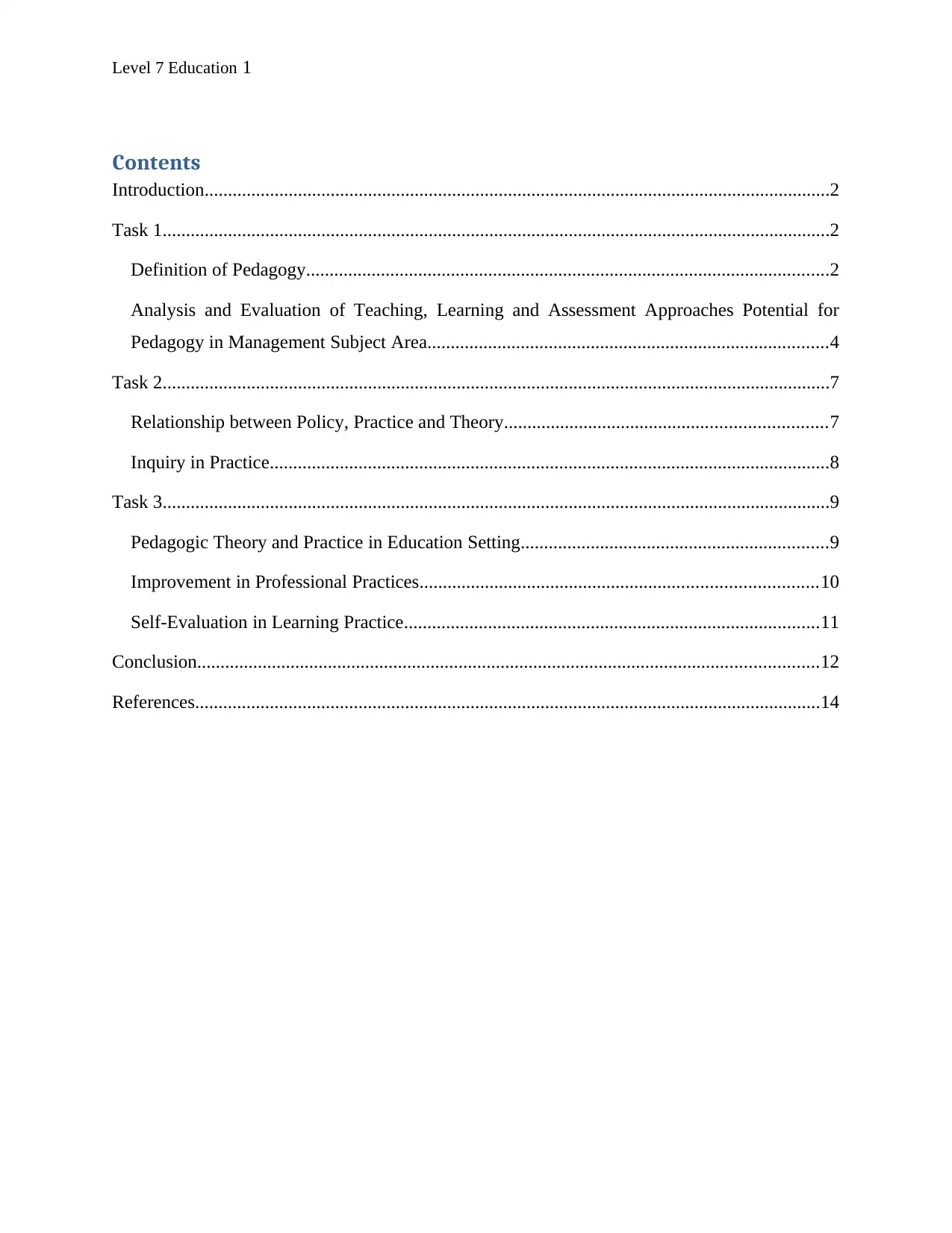
Level 7 Education 1
Contents
Introduction......................................................................................................................................2
Task 1...............................................................................................................................................2
Definition of Pedagogy................................................................................................................2
Analysis and Evaluation of Teaching, Learning and Assessment Approaches Potential for
Pedagogy in Management Subject Area......................................................................................4
Task 2...............................................................................................................................................7
Relationship between Policy, Practice and Theory.....................................................................7
Inquiry in Practice........................................................................................................................8
Task 3...............................................................................................................................................9
Pedagogic Theory and Practice in Education Setting..................................................................9
Improvement in Professional Practices.....................................................................................10
Self-Evaluation in Learning Practice.........................................................................................11
Conclusion.....................................................................................................................................12
References......................................................................................................................................14
Contents
Introduction......................................................................................................................................2
Task 1...............................................................................................................................................2
Definition of Pedagogy................................................................................................................2
Analysis and Evaluation of Teaching, Learning and Assessment Approaches Potential for
Pedagogy in Management Subject Area......................................................................................4
Task 2...............................................................................................................................................7
Relationship between Policy, Practice and Theory.....................................................................7
Inquiry in Practice........................................................................................................................8
Task 3...............................................................................................................................................9
Pedagogic Theory and Practice in Education Setting..................................................................9
Improvement in Professional Practices.....................................................................................10
Self-Evaluation in Learning Practice.........................................................................................11
Conclusion.....................................................................................................................................12
References......................................................................................................................................14
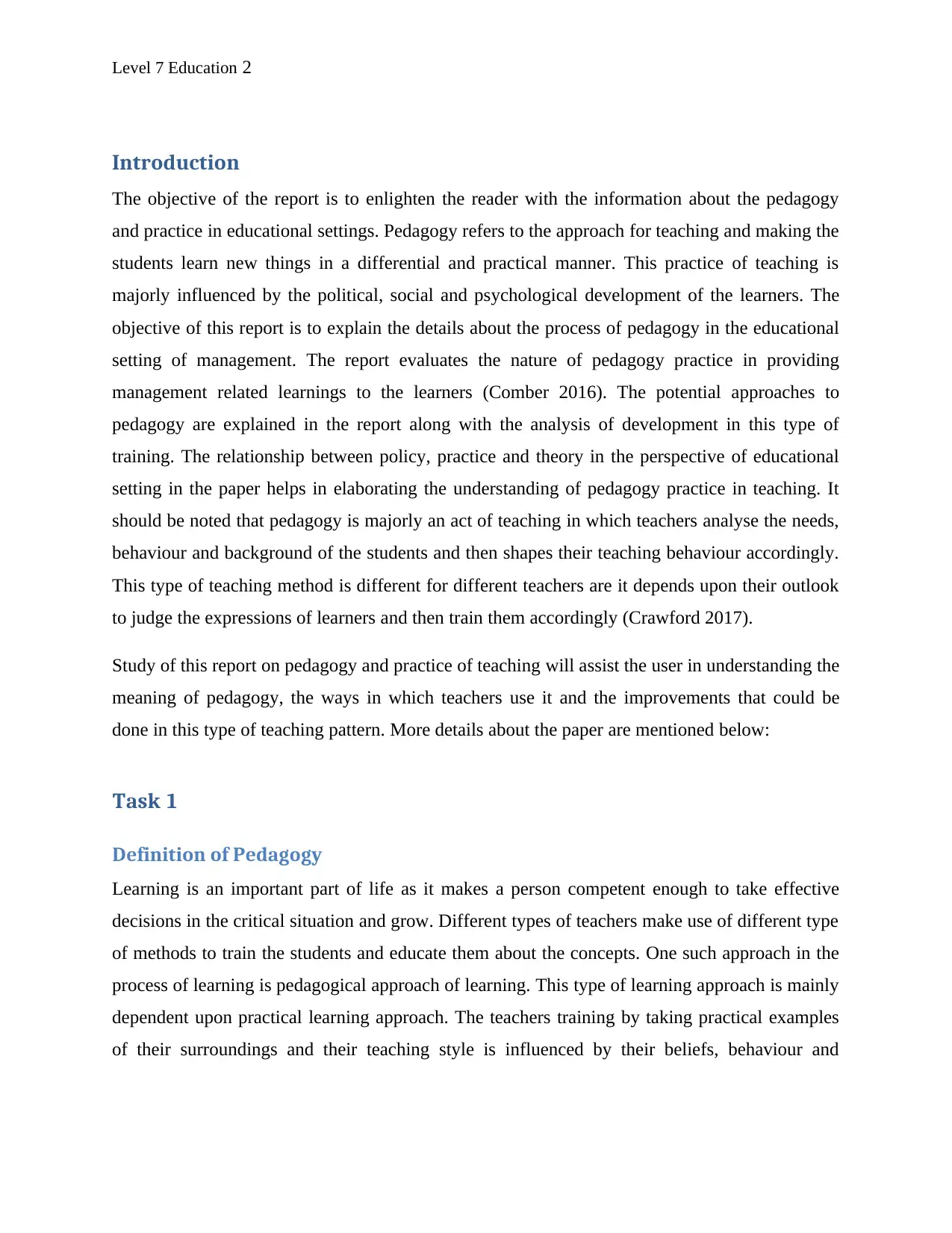
Level 7 Education 2
Introduction
The objective of the report is to enlighten the reader with the information about the pedagogy
and practice in educational settings. Pedagogy refers to the approach for teaching and making the
students learn new things in a differential and practical manner. This practice of teaching is
majorly influenced by the political, social and psychological development of the learners. The
objective of this report is to explain the details about the process of pedagogy in the educational
setting of management. The report evaluates the nature of pedagogy practice in providing
management related learnings to the learners (Comber 2016). The potential approaches to
pedagogy are explained in the report along with the analysis of development in this type of
training. The relationship between policy, practice and theory in the perspective of educational
setting in the paper helps in elaborating the understanding of pedagogy practice in teaching. It
should be noted that pedagogy is majorly an act of teaching in which teachers analyse the needs,
behaviour and background of the students and then shapes their teaching behaviour accordingly.
This type of teaching method is different for different teachers are it depends upon their outlook
to judge the expressions of learners and then train them accordingly (Crawford 2017).
Study of this report on pedagogy and practice of teaching will assist the user in understanding the
meaning of pedagogy, the ways in which teachers use it and the improvements that could be
done in this type of teaching pattern. More details about the paper are mentioned below:
Task 1
Definition of Pedagogy
Learning is an important part of life as it makes a person competent enough to take effective
decisions in the critical situation and grow. Different types of teachers make use of different type
of methods to train the students and educate them about the concepts. One such approach in the
process of learning is pedagogical approach of learning. This type of learning approach is mainly
dependent upon practical learning approach. The teachers training by taking practical examples
of their surroundings and their teaching style is influenced by their beliefs, behaviour and
Introduction
The objective of the report is to enlighten the reader with the information about the pedagogy
and practice in educational settings. Pedagogy refers to the approach for teaching and making the
students learn new things in a differential and practical manner. This practice of teaching is
majorly influenced by the political, social and psychological development of the learners. The
objective of this report is to explain the details about the process of pedagogy in the educational
setting of management. The report evaluates the nature of pedagogy practice in providing
management related learnings to the learners (Comber 2016). The potential approaches to
pedagogy are explained in the report along with the analysis of development in this type of
training. The relationship between policy, practice and theory in the perspective of educational
setting in the paper helps in elaborating the understanding of pedagogy practice in teaching. It
should be noted that pedagogy is majorly an act of teaching in which teachers analyse the needs,
behaviour and background of the students and then shapes their teaching behaviour accordingly.
This type of teaching method is different for different teachers are it depends upon their outlook
to judge the expressions of learners and then train them accordingly (Crawford 2017).
Study of this report on pedagogy and practice of teaching will assist the user in understanding the
meaning of pedagogy, the ways in which teachers use it and the improvements that could be
done in this type of teaching pattern. More details about the paper are mentioned below:
Task 1
Definition of Pedagogy
Learning is an important part of life as it makes a person competent enough to take effective
decisions in the critical situation and grow. Different types of teachers make use of different type
of methods to train the students and educate them about the concepts. One such approach in the
process of learning is pedagogical approach of learning. This type of learning approach is mainly
dependent upon practical learning approach. The teachers training by taking practical examples
of their surroundings and their teaching style is influenced by their beliefs, behaviour and
⊘ This is a preview!⊘
Do you want full access?
Subscribe today to unlock all pages.

Trusted by 1+ million students worldwide
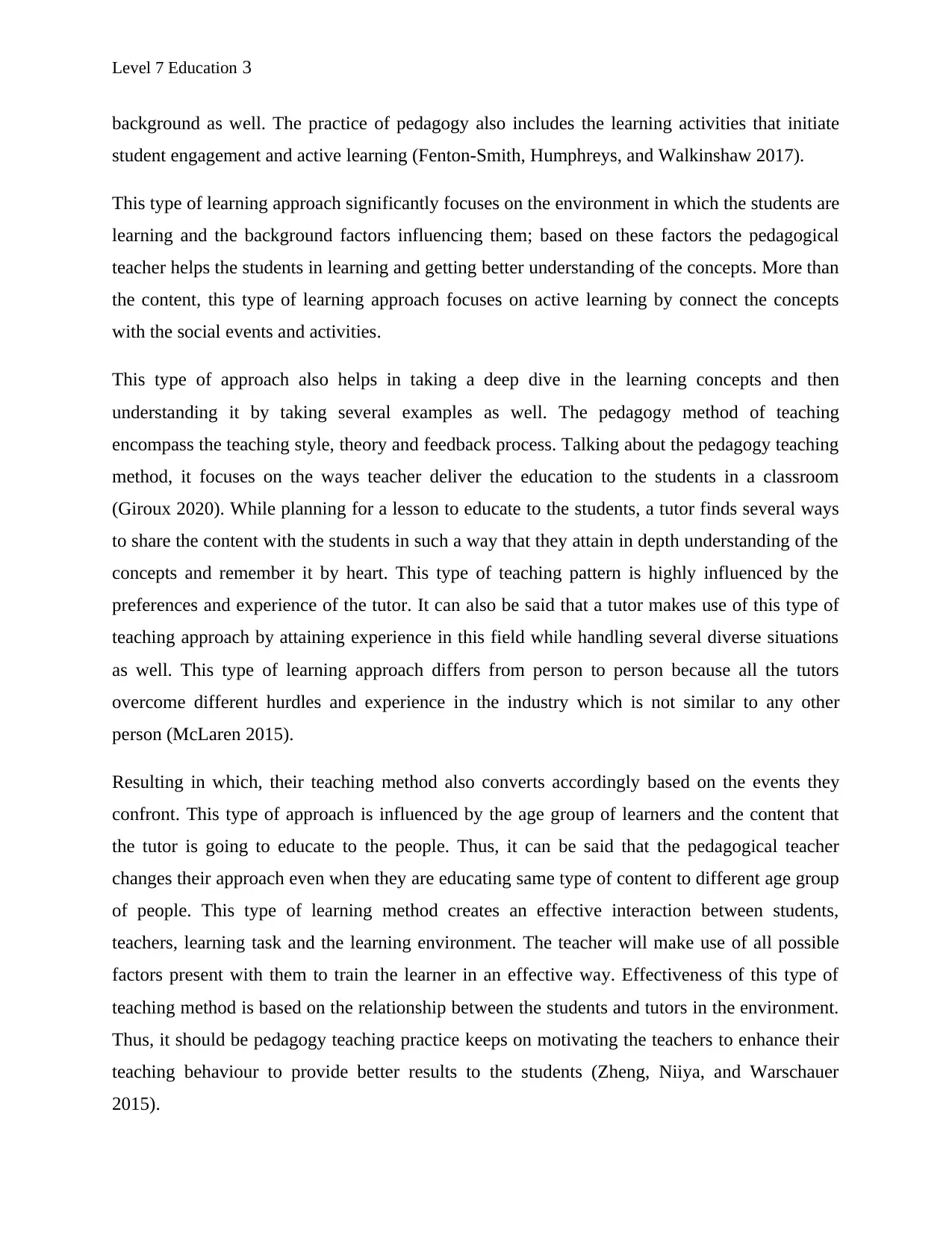
Level 7 Education 3
background as well. The practice of pedagogy also includes the learning activities that initiate
student engagement and active learning (Fenton-Smith, Humphreys, and Walkinshaw 2017).
This type of learning approach significantly focuses on the environment in which the students are
learning and the background factors influencing them; based on these factors the pedagogical
teacher helps the students in learning and getting better understanding of the concepts. More than
the content, this type of learning approach focuses on active learning by connect the concepts
with the social events and activities.
This type of approach also helps in taking a deep dive in the learning concepts and then
understanding it by taking several examples as well. The pedagogy method of teaching
encompass the teaching style, theory and feedback process. Talking about the pedagogy teaching
method, it focuses on the ways teacher deliver the education to the students in a classroom
(Giroux 2020). While planning for a lesson to educate to the students, a tutor finds several ways
to share the content with the students in such a way that they attain in depth understanding of the
concepts and remember it by heart. This type of teaching pattern is highly influenced by the
preferences and experience of the tutor. It can also be said that a tutor makes use of this type of
teaching approach by attaining experience in this field while handling several diverse situations
as well. This type of learning approach differs from person to person because all the tutors
overcome different hurdles and experience in the industry which is not similar to any other
person (McLaren 2015).
Resulting in which, their teaching method also converts accordingly based on the events they
confront. This type of approach is influenced by the age group of learners and the content that
the tutor is going to educate to the people. Thus, it can be said that the pedagogical teacher
changes their approach even when they are educating same type of content to different age group
of people. This type of learning method creates an effective interaction between students,
teachers, learning task and the learning environment. The teacher will make use of all possible
factors present with them to train the learner in an effective way. Effectiveness of this type of
teaching method is based on the relationship between the students and tutors in the environment.
Thus, it should be pedagogy teaching practice keeps on motivating the teachers to enhance their
teaching behaviour to provide better results to the students (Zheng, Niiya, and Warschauer
2015).
background as well. The practice of pedagogy also includes the learning activities that initiate
student engagement and active learning (Fenton-Smith, Humphreys, and Walkinshaw 2017).
This type of learning approach significantly focuses on the environment in which the students are
learning and the background factors influencing them; based on these factors the pedagogical
teacher helps the students in learning and getting better understanding of the concepts. More than
the content, this type of learning approach focuses on active learning by connect the concepts
with the social events and activities.
This type of approach also helps in taking a deep dive in the learning concepts and then
understanding it by taking several examples as well. The pedagogy method of teaching
encompass the teaching style, theory and feedback process. Talking about the pedagogy teaching
method, it focuses on the ways teacher deliver the education to the students in a classroom
(Giroux 2020). While planning for a lesson to educate to the students, a tutor finds several ways
to share the content with the students in such a way that they attain in depth understanding of the
concepts and remember it by heart. This type of teaching pattern is highly influenced by the
preferences and experience of the tutor. It can also be said that a tutor makes use of this type of
teaching approach by attaining experience in this field while handling several diverse situations
as well. This type of learning approach differs from person to person because all the tutors
overcome different hurdles and experience in the industry which is not similar to any other
person (McLaren 2015).
Resulting in which, their teaching method also converts accordingly based on the events they
confront. This type of approach is influenced by the age group of learners and the content that
the tutor is going to educate to the people. Thus, it can be said that the pedagogical teacher
changes their approach even when they are educating same type of content to different age group
of people. This type of learning method creates an effective interaction between students,
teachers, learning task and the learning environment. The teacher will make use of all possible
factors present with them to train the learner in an effective way. Effectiveness of this type of
teaching method is based on the relationship between the students and tutors in the environment.
Thus, it should be pedagogy teaching practice keeps on motivating the teachers to enhance their
teaching behaviour to provide better results to the students (Zheng, Niiya, and Warschauer
2015).
Paraphrase This Document
Need a fresh take? Get an instant paraphrase of this document with our AI Paraphraser
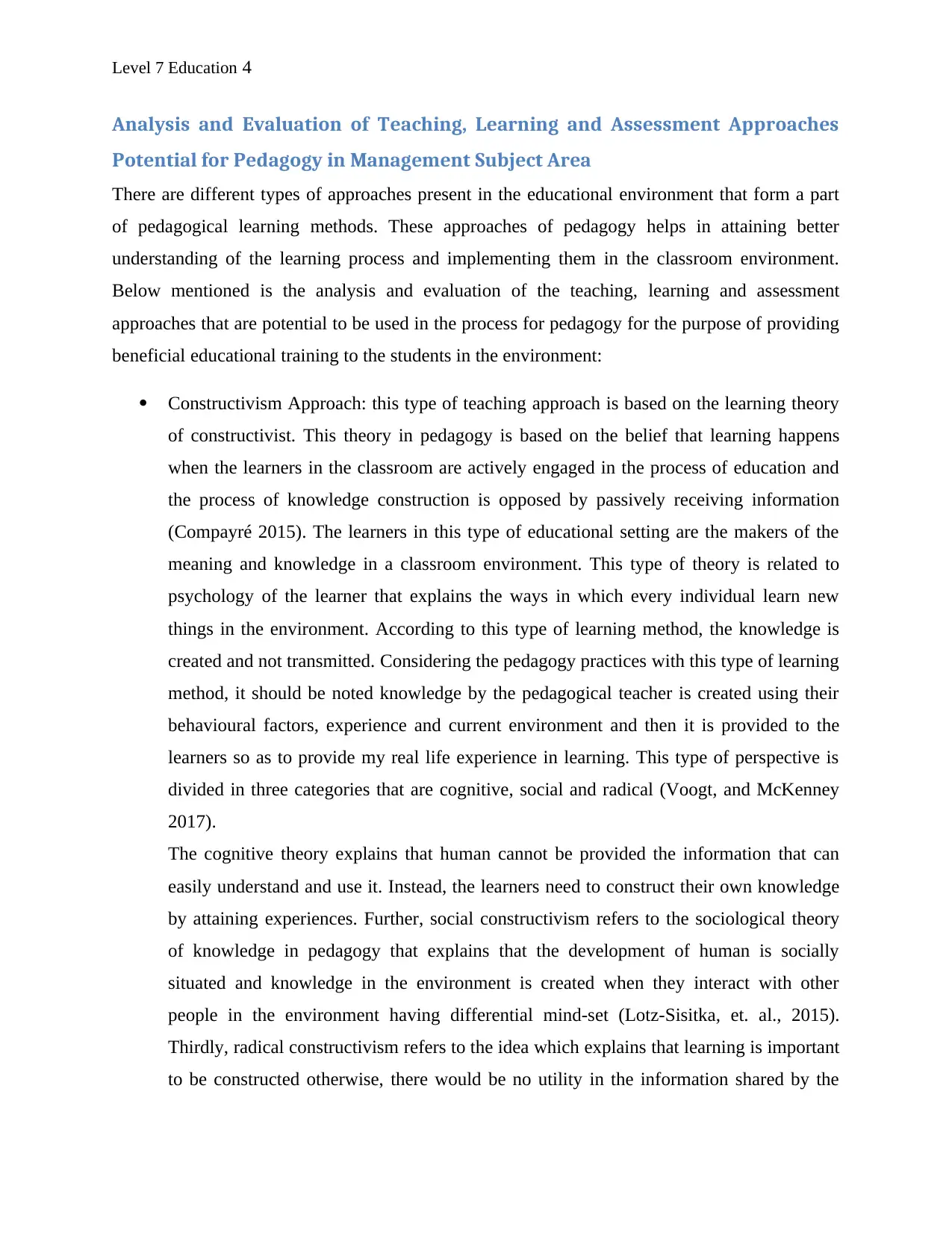
Level 7 Education 4
Analysis and Evaluation of Teaching, Learning and Assessment Approaches
Potential for Pedagogy in Management Subject Area
There are different types of approaches present in the educational environment that form a part
of pedagogical learning methods. These approaches of pedagogy helps in attaining better
understanding of the learning process and implementing them in the classroom environment.
Below mentioned is the analysis and evaluation of the teaching, learning and assessment
approaches that are potential to be used in the process for pedagogy for the purpose of providing
beneficial educational training to the students in the environment:
Constructivism Approach: this type of teaching approach is based on the learning theory
of constructivist. This theory in pedagogy is based on the belief that learning happens
when the learners in the classroom are actively engaged in the process of education and
the process of knowledge construction is opposed by passively receiving information
(Compayré 2015). The learners in this type of educational setting are the makers of the
meaning and knowledge in a classroom environment. This type of theory is related to
psychology of the learner that explains the ways in which every individual learn new
things in the environment. According to this type of learning method, the knowledge is
created and not transmitted. Considering the pedagogy practices with this type of learning
method, it should be noted knowledge by the pedagogical teacher is created using their
behavioural factors, experience and current environment and then it is provided to the
learners so as to provide my real life experience in learning. This type of perspective is
divided in three categories that are cognitive, social and radical (Voogt, and McKenney
2017).
The cognitive theory explains that human cannot be provided the information that can
easily understand and use it. Instead, the learners need to construct their own knowledge
by attaining experiences. Further, social constructivism refers to the sociological theory
of knowledge in pedagogy that explains that the development of human is socially
situated and knowledge in the environment is created when they interact with other
people in the environment having differential mind-set (Lotz-Sisitka, et. al., 2015).
Thirdly, radical constructivism refers to the idea which explains that learning is important
to be constructed otherwise, there would be no utility in the information shared by the
Analysis and Evaluation of Teaching, Learning and Assessment Approaches
Potential for Pedagogy in Management Subject Area
There are different types of approaches present in the educational environment that form a part
of pedagogical learning methods. These approaches of pedagogy helps in attaining better
understanding of the learning process and implementing them in the classroom environment.
Below mentioned is the analysis and evaluation of the teaching, learning and assessment
approaches that are potential to be used in the process for pedagogy for the purpose of providing
beneficial educational training to the students in the environment:
Constructivism Approach: this type of teaching approach is based on the learning theory
of constructivist. This theory in pedagogy is based on the belief that learning happens
when the learners in the classroom are actively engaged in the process of education and
the process of knowledge construction is opposed by passively receiving information
(Compayré 2015). The learners in this type of educational setting are the makers of the
meaning and knowledge in a classroom environment. This type of theory is related to
psychology of the learner that explains the ways in which every individual learn new
things in the environment. According to this type of learning method, the knowledge is
created and not transmitted. Considering the pedagogy practices with this type of learning
method, it should be noted knowledge by the pedagogical teacher is created using their
behavioural factors, experience and current environment and then it is provided to the
learners so as to provide my real life experience in learning. This type of perspective is
divided in three categories that are cognitive, social and radical (Voogt, and McKenney
2017).
The cognitive theory explains that human cannot be provided the information that can
easily understand and use it. Instead, the learners need to construct their own knowledge
by attaining experiences. Further, social constructivism refers to the sociological theory
of knowledge in pedagogy that explains that the development of human is socially
situated and knowledge in the environment is created when they interact with other
people in the environment having differential mind-set (Lotz-Sisitka, et. al., 2015).
Thirdly, radical constructivism refers to the idea which explains that learning is important
to be constructed otherwise, there would be no utility in the information shared by the
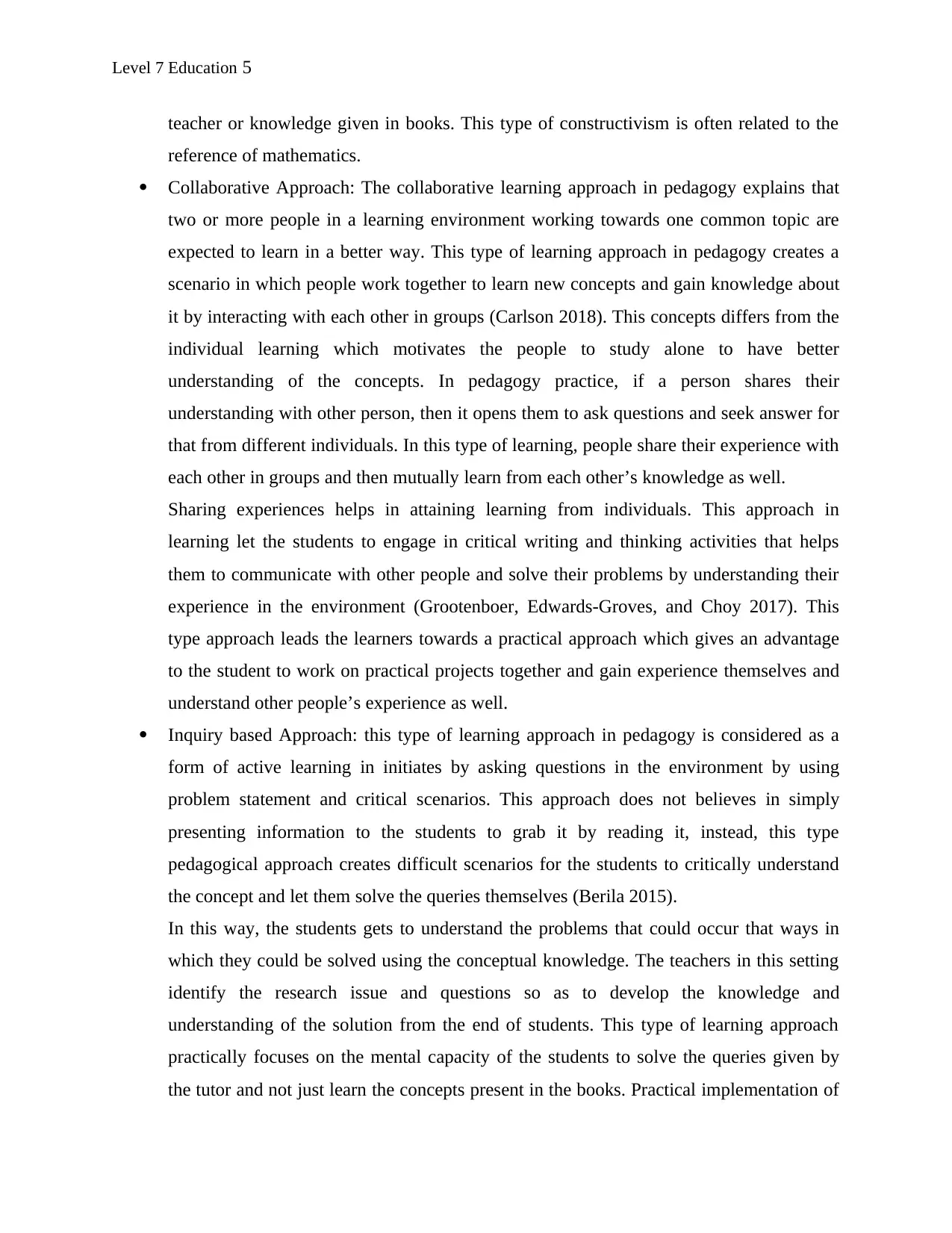
Level 7 Education 5
teacher or knowledge given in books. This type of constructivism is often related to the
reference of mathematics.
Collaborative Approach: The collaborative learning approach in pedagogy explains that
two or more people in a learning environment working towards one common topic are
expected to learn in a better way. This type of learning approach in pedagogy creates a
scenario in which people work together to learn new concepts and gain knowledge about
it by interacting with each other in groups (Carlson 2018). This concepts differs from the
individual learning which motivates the people to study alone to have better
understanding of the concepts. In pedagogy practice, if a person shares their
understanding with other person, then it opens them to ask questions and seek answer for
that from different individuals. In this type of learning, people share their experience with
each other in groups and then mutually learn from each other’s knowledge as well.
Sharing experiences helps in attaining learning from individuals. This approach in
learning let the students to engage in critical writing and thinking activities that helps
them to communicate with other people and solve their problems by understanding their
experience in the environment (Grootenboer, Edwards-Groves, and Choy 2017). This
type approach leads the learners towards a practical approach which gives an advantage
to the student to work on practical projects together and gain experience themselves and
understand other people’s experience as well.
Inquiry based Approach: this type of learning approach in pedagogy is considered as a
form of active learning in initiates by asking questions in the environment by using
problem statement and critical scenarios. This approach does not believes in simply
presenting information to the students to grab it by reading it, instead, this type
pedagogical approach creates difficult scenarios for the students to critically understand
the concept and let them solve the queries themselves (Berila 2015).
In this way, the students gets to understand the problems that could occur that ways in
which they could be solved using the conceptual knowledge. The teachers in this setting
identify the research issue and questions so as to develop the knowledge and
understanding of the solution from the end of students. This type of learning approach
practically focuses on the mental capacity of the students to solve the queries given by
the tutor and not just learn the concepts present in the books. Practical implementation of
teacher or knowledge given in books. This type of constructivism is often related to the
reference of mathematics.
Collaborative Approach: The collaborative learning approach in pedagogy explains that
two or more people in a learning environment working towards one common topic are
expected to learn in a better way. This type of learning approach in pedagogy creates a
scenario in which people work together to learn new concepts and gain knowledge about
it by interacting with each other in groups (Carlson 2018). This concepts differs from the
individual learning which motivates the people to study alone to have better
understanding of the concepts. In pedagogy practice, if a person shares their
understanding with other person, then it opens them to ask questions and seek answer for
that from different individuals. In this type of learning, people share their experience with
each other in groups and then mutually learn from each other’s knowledge as well.
Sharing experiences helps in attaining learning from individuals. This approach in
learning let the students to engage in critical writing and thinking activities that helps
them to communicate with other people and solve their problems by understanding their
experience in the environment (Grootenboer, Edwards-Groves, and Choy 2017). This
type approach leads the learners towards a practical approach which gives an advantage
to the student to work on practical projects together and gain experience themselves and
understand other people’s experience as well.
Inquiry based Approach: this type of learning approach in pedagogy is considered as a
form of active learning in initiates by asking questions in the environment by using
problem statement and critical scenarios. This approach does not believes in simply
presenting information to the students to grab it by reading it, instead, this type
pedagogical approach creates difficult scenarios for the students to critically understand
the concept and let them solve the queries themselves (Berila 2015).
In this way, the students gets to understand the problems that could occur that ways in
which they could be solved using the conceptual knowledge. The teachers in this setting
identify the research issue and questions so as to develop the knowledge and
understanding of the solution from the end of students. This type of learning approach
practically focuses on the mental capacity of the students to solve the queries given by
the tutor and not just learn the concepts present in the books. Practical implementation of
⊘ This is a preview!⊘
Do you want full access?
Subscribe today to unlock all pages.

Trusted by 1+ million students worldwide
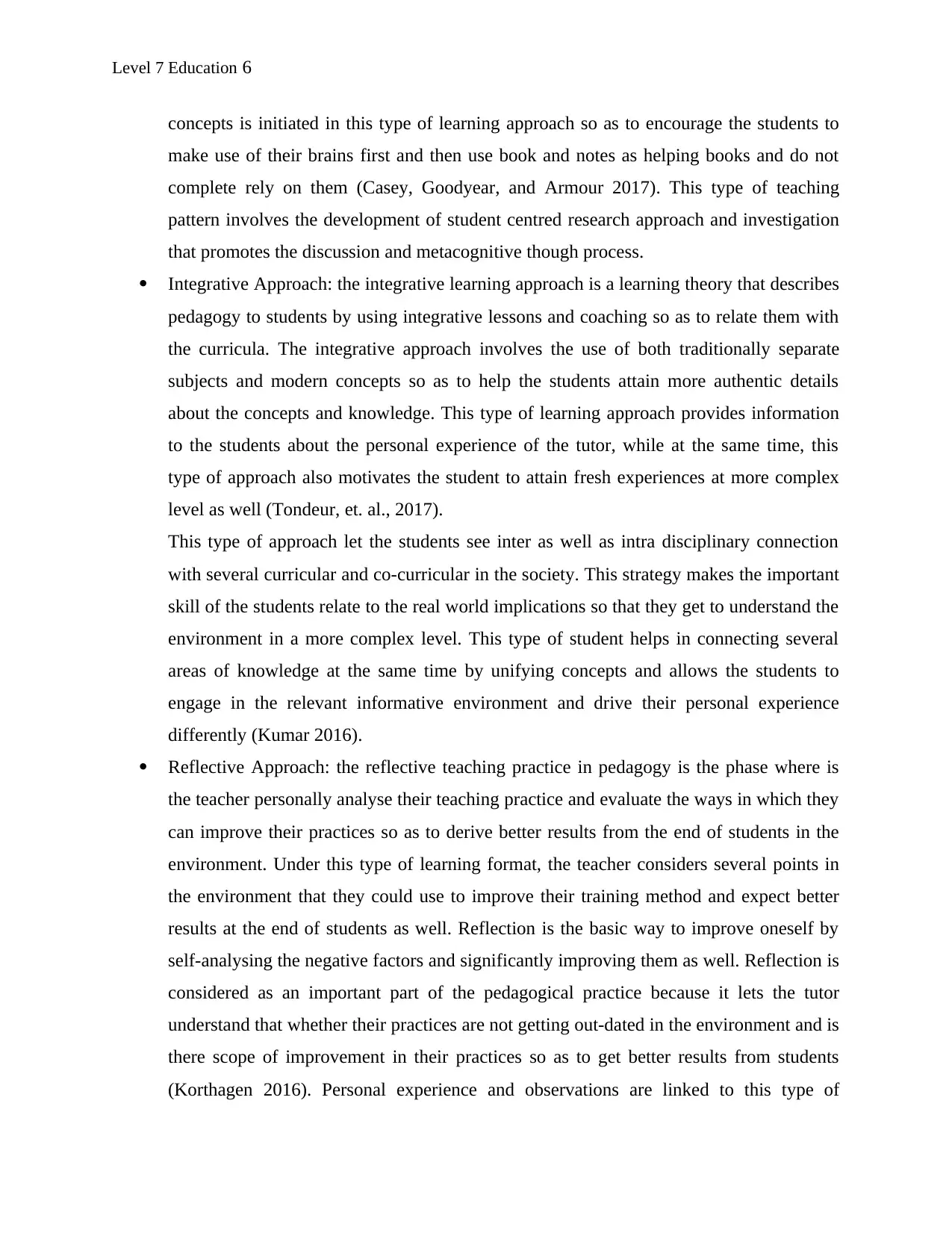
Level 7 Education 6
concepts is initiated in this type of learning approach so as to encourage the students to
make use of their brains first and then use book and notes as helping books and do not
complete rely on them (Casey, Goodyear, and Armour 2017). This type of teaching
pattern involves the development of student centred research approach and investigation
that promotes the discussion and metacognitive though process.
Integrative Approach: the integrative learning approach is a learning theory that describes
pedagogy to students by using integrative lessons and coaching so as to relate them with
the curricula. The integrative approach involves the use of both traditionally separate
subjects and modern concepts so as to help the students attain more authentic details
about the concepts and knowledge. This type of learning approach provides information
to the students about the personal experience of the tutor, while at the same time, this
type of approach also motivates the student to attain fresh experiences at more complex
level as well (Tondeur, et. al., 2017).
This type of approach let the students see inter as well as intra disciplinary connection
with several curricular and co-curricular in the society. This strategy makes the important
skill of the students relate to the real world implications so that they get to understand the
environment in a more complex level. This type of student helps in connecting several
areas of knowledge at the same time by unifying concepts and allows the students to
engage in the relevant informative environment and drive their personal experience
differently (Kumar 2016).
Reflective Approach: the reflective teaching practice in pedagogy is the phase where is
the teacher personally analyse their teaching practice and evaluate the ways in which they
can improve their practices so as to derive better results from the end of students in the
environment. Under this type of learning format, the teacher considers several points in
the environment that they could use to improve their training method and expect better
results at the end of students as well. Reflection is the basic way to improve oneself by
self-analysing the negative factors and significantly improving them as well. Reflection is
considered as an important part of the pedagogical practice because it lets the tutor
understand that whether their practices are not getting out-dated in the environment and is
there scope of improvement in their practices so as to get better results from students
(Korthagen 2016). Personal experience and observations are linked to this type of
concepts is initiated in this type of learning approach so as to encourage the students to
make use of their brains first and then use book and notes as helping books and do not
complete rely on them (Casey, Goodyear, and Armour 2017). This type of teaching
pattern involves the development of student centred research approach and investigation
that promotes the discussion and metacognitive though process.
Integrative Approach: the integrative learning approach is a learning theory that describes
pedagogy to students by using integrative lessons and coaching so as to relate them with
the curricula. The integrative approach involves the use of both traditionally separate
subjects and modern concepts so as to help the students attain more authentic details
about the concepts and knowledge. This type of learning approach provides information
to the students about the personal experience of the tutor, while at the same time, this
type of approach also motivates the student to attain fresh experiences at more complex
level as well (Tondeur, et. al., 2017).
This type of approach let the students see inter as well as intra disciplinary connection
with several curricular and co-curricular in the society. This strategy makes the important
skill of the students relate to the real world implications so that they get to understand the
environment in a more complex level. This type of student helps in connecting several
areas of knowledge at the same time by unifying concepts and allows the students to
engage in the relevant informative environment and drive their personal experience
differently (Kumar 2016).
Reflective Approach: the reflective teaching practice in pedagogy is the phase where is
the teacher personally analyse their teaching practice and evaluate the ways in which they
can improve their practices so as to derive better results from the end of students in the
environment. Under this type of learning format, the teacher considers several points in
the environment that they could use to improve their training method and expect better
results at the end of students as well. Reflection is the basic way to improve oneself by
self-analysing the negative factors and significantly improving them as well. Reflection is
considered as an important part of the pedagogical practice because it lets the tutor
understand that whether their practices are not getting out-dated in the environment and is
there scope of improvement in their practices so as to get better results from students
(Korthagen 2016). Personal experience and observations are linked to this type of
Paraphrase This Document
Need a fresh take? Get an instant paraphrase of this document with our AI Paraphraser
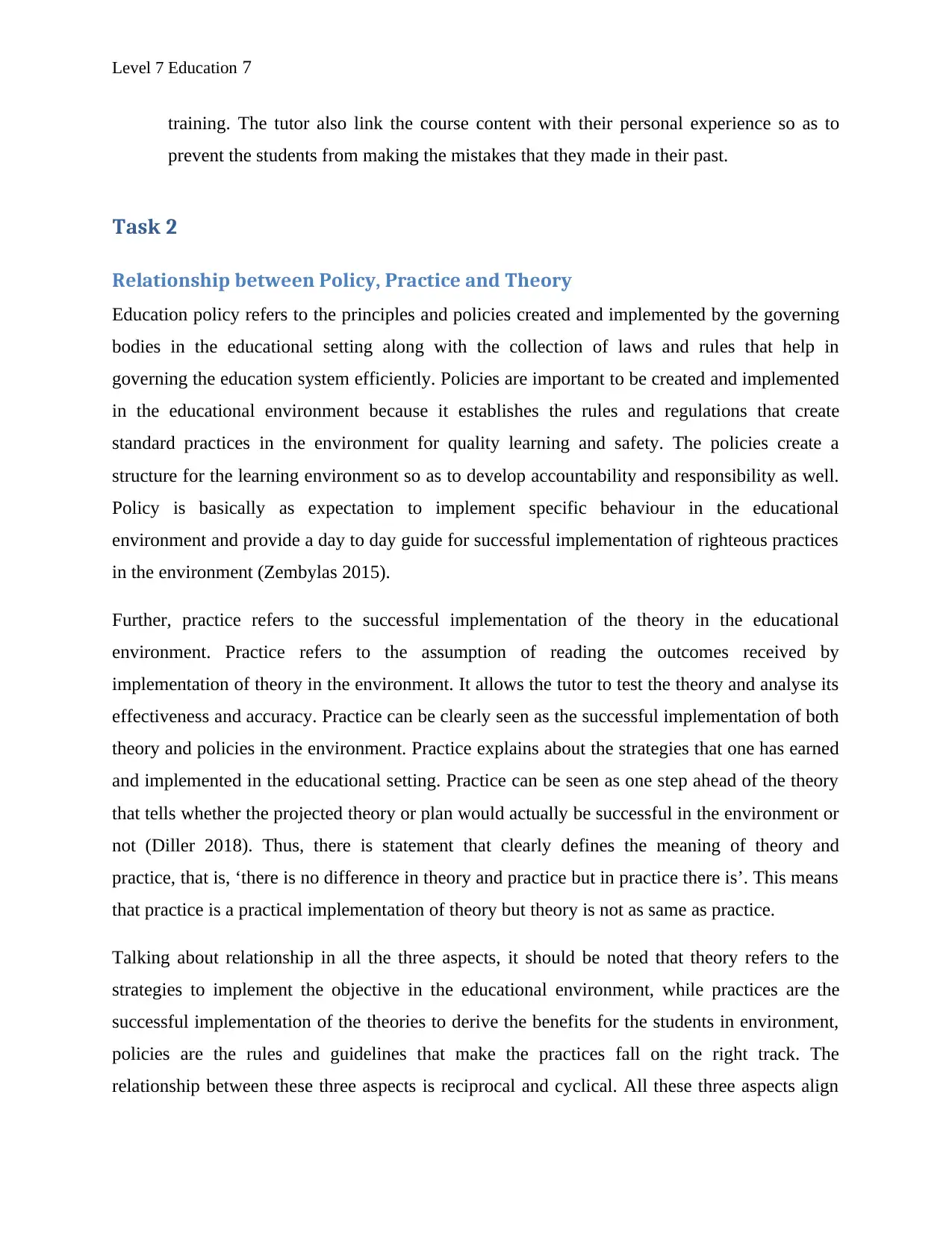
Level 7 Education 7
training. The tutor also link the course content with their personal experience so as to
prevent the students from making the mistakes that they made in their past.
Task 2
Relationship between Policy, Practice and Theory
Education policy refers to the principles and policies created and implemented by the governing
bodies in the educational setting along with the collection of laws and rules that help in
governing the education system efficiently. Policies are important to be created and implemented
in the educational environment because it establishes the rules and regulations that create
standard practices in the environment for quality learning and safety. The policies create a
structure for the learning environment so as to develop accountability and responsibility as well.
Policy is basically as expectation to implement specific behaviour in the educational
environment and provide a day to day guide for successful implementation of righteous practices
in the environment (Zembylas 2015).
Further, practice refers to the successful implementation of the theory in the educational
environment. Practice refers to the assumption of reading the outcomes received by
implementation of theory in the environment. It allows the tutor to test the theory and analyse its
effectiveness and accuracy. Practice can be clearly seen as the successful implementation of both
theory and policies in the environment. Practice explains about the strategies that one has earned
and implemented in the educational setting. Practice can be seen as one step ahead of the theory
that tells whether the projected theory or plan would actually be successful in the environment or
not (Diller 2018). Thus, there is statement that clearly defines the meaning of theory and
practice, that is, ‘there is no difference in theory and practice but in practice there is’. This means
that practice is a practical implementation of theory but theory is not as same as practice.
Talking about relationship in all the three aspects, it should be noted that theory refers to the
strategies to implement the objective in the educational environment, while practices are the
successful implementation of the theories to derive the benefits for the students in environment,
policies are the rules and guidelines that make the practices fall on the right track. The
relationship between these three aspects is reciprocal and cyclical. All these three aspects align
training. The tutor also link the course content with their personal experience so as to
prevent the students from making the mistakes that they made in their past.
Task 2
Relationship between Policy, Practice and Theory
Education policy refers to the principles and policies created and implemented by the governing
bodies in the educational setting along with the collection of laws and rules that help in
governing the education system efficiently. Policies are important to be created and implemented
in the educational environment because it establishes the rules and regulations that create
standard practices in the environment for quality learning and safety. The policies create a
structure for the learning environment so as to develop accountability and responsibility as well.
Policy is basically as expectation to implement specific behaviour in the educational
environment and provide a day to day guide for successful implementation of righteous practices
in the environment (Zembylas 2015).
Further, practice refers to the successful implementation of the theory in the educational
environment. Practice refers to the assumption of reading the outcomes received by
implementation of theory in the environment. It allows the tutor to test the theory and analyse its
effectiveness and accuracy. Practice can be clearly seen as the successful implementation of both
theory and policies in the environment. Practice explains about the strategies that one has earned
and implemented in the educational setting. Practice can be seen as one step ahead of the theory
that tells whether the projected theory or plan would actually be successful in the environment or
not (Diller 2018). Thus, there is statement that clearly defines the meaning of theory and
practice, that is, ‘there is no difference in theory and practice but in practice there is’. This means
that practice is a practical implementation of theory but theory is not as same as practice.
Talking about relationship in all the three aspects, it should be noted that theory refers to the
strategies to implement the objective in the educational environment, while practices are the
successful implementation of the theories to derive the benefits for the students in environment,
policies are the rules and guidelines that make the practices fall on the right track. The
relationship between these three aspects is reciprocal and cyclical. All these three aspects align
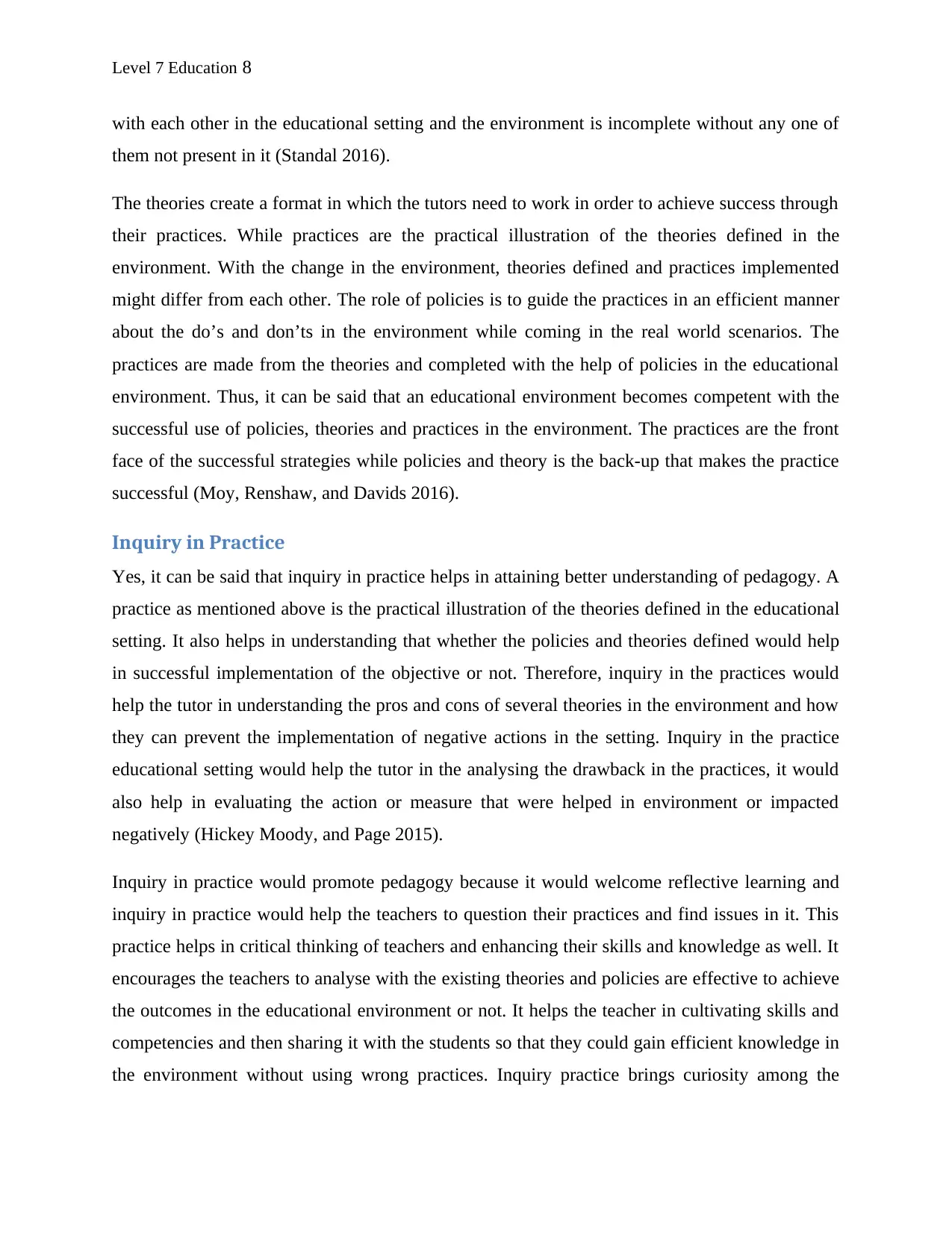
Level 7 Education 8
with each other in the educational setting and the environment is incomplete without any one of
them not present in it (Standal 2016).
The theories create a format in which the tutors need to work in order to achieve success through
their practices. While practices are the practical illustration of the theories defined in the
environment. With the change in the environment, theories defined and practices implemented
might differ from each other. The role of policies is to guide the practices in an efficient manner
about the do’s and don’ts in the environment while coming in the real world scenarios. The
practices are made from the theories and completed with the help of policies in the educational
environment. Thus, it can be said that an educational environment becomes competent with the
successful use of policies, theories and practices in the environment. The practices are the front
face of the successful strategies while policies and theory is the back-up that makes the practice
successful (Moy, Renshaw, and Davids 2016).
Inquiry in Practice
Yes, it can be said that inquiry in practice helps in attaining better understanding of pedagogy. A
practice as mentioned above is the practical illustration of the theories defined in the educational
setting. It also helps in understanding that whether the policies and theories defined would help
in successful implementation of the objective or not. Therefore, inquiry in the practices would
help the tutor in understanding the pros and cons of several theories in the environment and how
they can prevent the implementation of negative actions in the setting. Inquiry in the practice
educational setting would help the tutor in the analysing the drawback in the practices, it would
also help in evaluating the action or measure that were helped in environment or impacted
negatively (Hickey Moody, and Page 2015).
Inquiry in practice would promote pedagogy because it would welcome reflective learning and
inquiry in practice would help the teachers to question their practices and find issues in it. This
practice helps in critical thinking of teachers and enhancing their skills and knowledge as well. It
encourages the teachers to analyse with the existing theories and policies are effective to achieve
the outcomes in the educational environment or not. It helps the teacher in cultivating skills and
competencies and then sharing it with the students so that they could gain efficient knowledge in
the environment without using wrong practices. Inquiry practice brings curiosity among the
with each other in the educational setting and the environment is incomplete without any one of
them not present in it (Standal 2016).
The theories create a format in which the tutors need to work in order to achieve success through
their practices. While practices are the practical illustration of the theories defined in the
environment. With the change in the environment, theories defined and practices implemented
might differ from each other. The role of policies is to guide the practices in an efficient manner
about the do’s and don’ts in the environment while coming in the real world scenarios. The
practices are made from the theories and completed with the help of policies in the educational
environment. Thus, it can be said that an educational environment becomes competent with the
successful use of policies, theories and practices in the environment. The practices are the front
face of the successful strategies while policies and theory is the back-up that makes the practice
successful (Moy, Renshaw, and Davids 2016).
Inquiry in Practice
Yes, it can be said that inquiry in practice helps in attaining better understanding of pedagogy. A
practice as mentioned above is the practical illustration of the theories defined in the educational
setting. It also helps in understanding that whether the policies and theories defined would help
in successful implementation of the objective or not. Therefore, inquiry in the practices would
help the tutor in understanding the pros and cons of several theories in the environment and how
they can prevent the implementation of negative actions in the setting. Inquiry in the practice
educational setting would help the tutor in the analysing the drawback in the practices, it would
also help in evaluating the action or measure that were helped in environment or impacted
negatively (Hickey Moody, and Page 2015).
Inquiry in practice would promote pedagogy because it would welcome reflective learning and
inquiry in practice would help the teachers to question their practices and find issues in it. This
practice helps in critical thinking of teachers and enhancing their skills and knowledge as well. It
encourages the teachers to analyse with the existing theories and policies are effective to achieve
the outcomes in the educational environment or not. It helps the teacher in cultivating skills and
competencies and then sharing it with the students so that they could gain efficient knowledge in
the environment without using wrong practices. Inquiry practice brings curiosity among the
⊘ This is a preview!⊘
Do you want full access?
Subscribe today to unlock all pages.

Trusted by 1+ million students worldwide
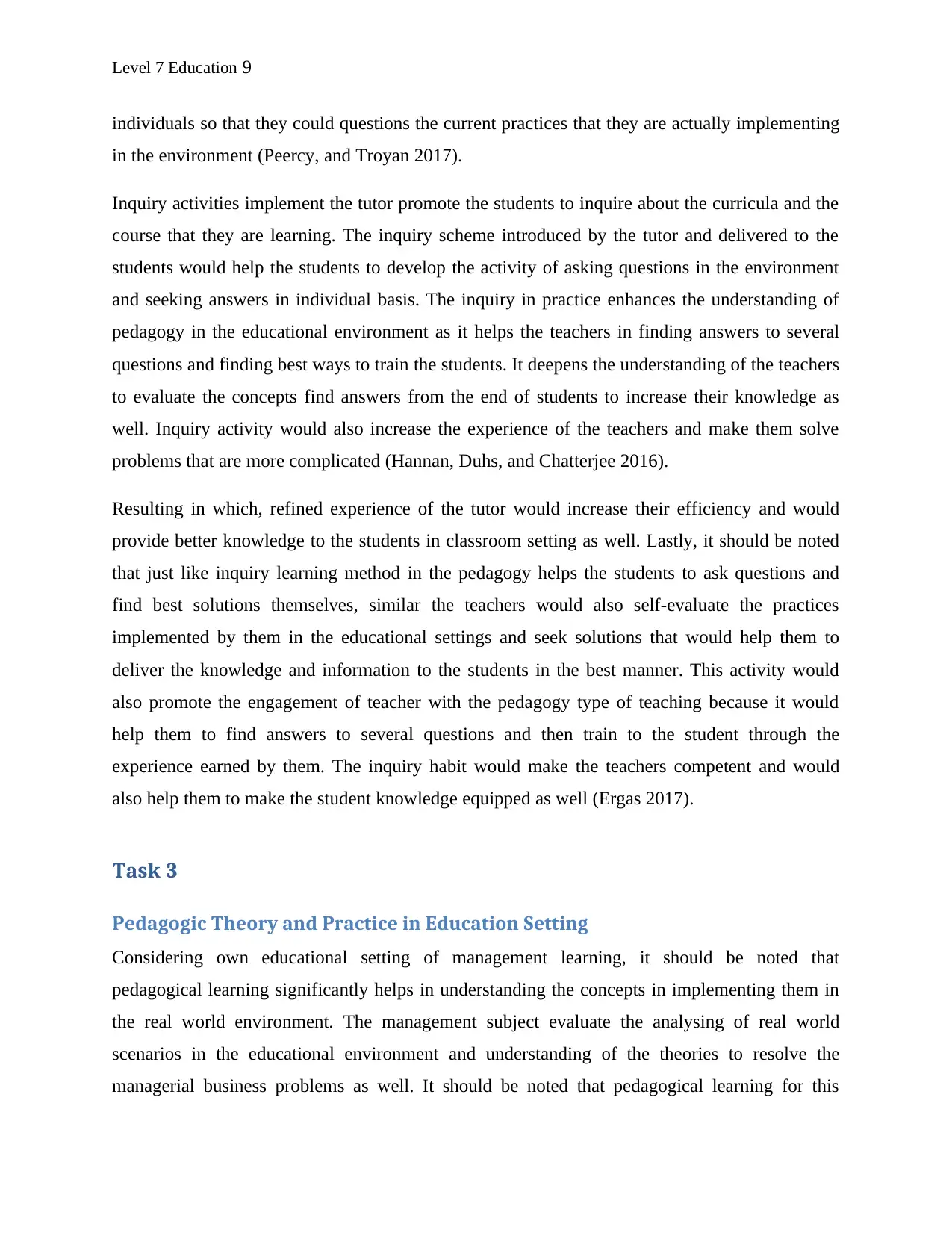
Level 7 Education 9
individuals so that they could questions the current practices that they are actually implementing
in the environment (Peercy, and Troyan 2017).
Inquiry activities implement the tutor promote the students to inquire about the curricula and the
course that they are learning. The inquiry scheme introduced by the tutor and delivered to the
students would help the students to develop the activity of asking questions in the environment
and seeking answers in individual basis. The inquiry in practice enhances the understanding of
pedagogy in the educational environment as it helps the teachers in finding answers to several
questions and finding best ways to train the students. It deepens the understanding of the teachers
to evaluate the concepts find answers from the end of students to increase their knowledge as
well. Inquiry activity would also increase the experience of the teachers and make them solve
problems that are more complicated (Hannan, Duhs, and Chatterjee 2016).
Resulting in which, refined experience of the tutor would increase their efficiency and would
provide better knowledge to the students in classroom setting as well. Lastly, it should be noted
that just like inquiry learning method in the pedagogy helps the students to ask questions and
find best solutions themselves, similar the teachers would also self-evaluate the practices
implemented by them in the educational settings and seek solutions that would help them to
deliver the knowledge and information to the students in the best manner. This activity would
also promote the engagement of teacher with the pedagogy type of teaching because it would
help them to find answers to several questions and then train to the student through the
experience earned by them. The inquiry habit would make the teachers competent and would
also help them to make the student knowledge equipped as well (Ergas 2017).
Task 3
Pedagogic Theory and Practice in Education Setting
Considering own educational setting of management learning, it should be noted that
pedagogical learning significantly helps in understanding the concepts in implementing them in
the real world environment. The management subject evaluate the analysing of real world
scenarios in the educational environment and understanding of the theories to resolve the
managerial business problems as well. It should be noted that pedagogical learning for this
individuals so that they could questions the current practices that they are actually implementing
in the environment (Peercy, and Troyan 2017).
Inquiry activities implement the tutor promote the students to inquire about the curricula and the
course that they are learning. The inquiry scheme introduced by the tutor and delivered to the
students would help the students to develop the activity of asking questions in the environment
and seeking answers in individual basis. The inquiry in practice enhances the understanding of
pedagogy in the educational environment as it helps the teachers in finding answers to several
questions and finding best ways to train the students. It deepens the understanding of the teachers
to evaluate the concepts find answers from the end of students to increase their knowledge as
well. Inquiry activity would also increase the experience of the teachers and make them solve
problems that are more complicated (Hannan, Duhs, and Chatterjee 2016).
Resulting in which, refined experience of the tutor would increase their efficiency and would
provide better knowledge to the students in classroom setting as well. Lastly, it should be noted
that just like inquiry learning method in the pedagogy helps the students to ask questions and
find best solutions themselves, similar the teachers would also self-evaluate the practices
implemented by them in the educational settings and seek solutions that would help them to
deliver the knowledge and information to the students in the best manner. This activity would
also promote the engagement of teacher with the pedagogy type of teaching because it would
help them to find answers to several questions and then train to the student through the
experience earned by them. The inquiry habit would make the teachers competent and would
also help them to make the student knowledge equipped as well (Ergas 2017).
Task 3
Pedagogic Theory and Practice in Education Setting
Considering own educational setting of management learning, it should be noted that
pedagogical learning significantly helps in understanding the concepts in implementing them in
the real world environment. The management subject evaluate the analysing of real world
scenarios in the educational environment and understanding of the theories to resolve the
managerial business problems as well. It should be noted that pedagogical learning for this
Paraphrase This Document
Need a fresh take? Get an instant paraphrase of this document with our AI Paraphraser
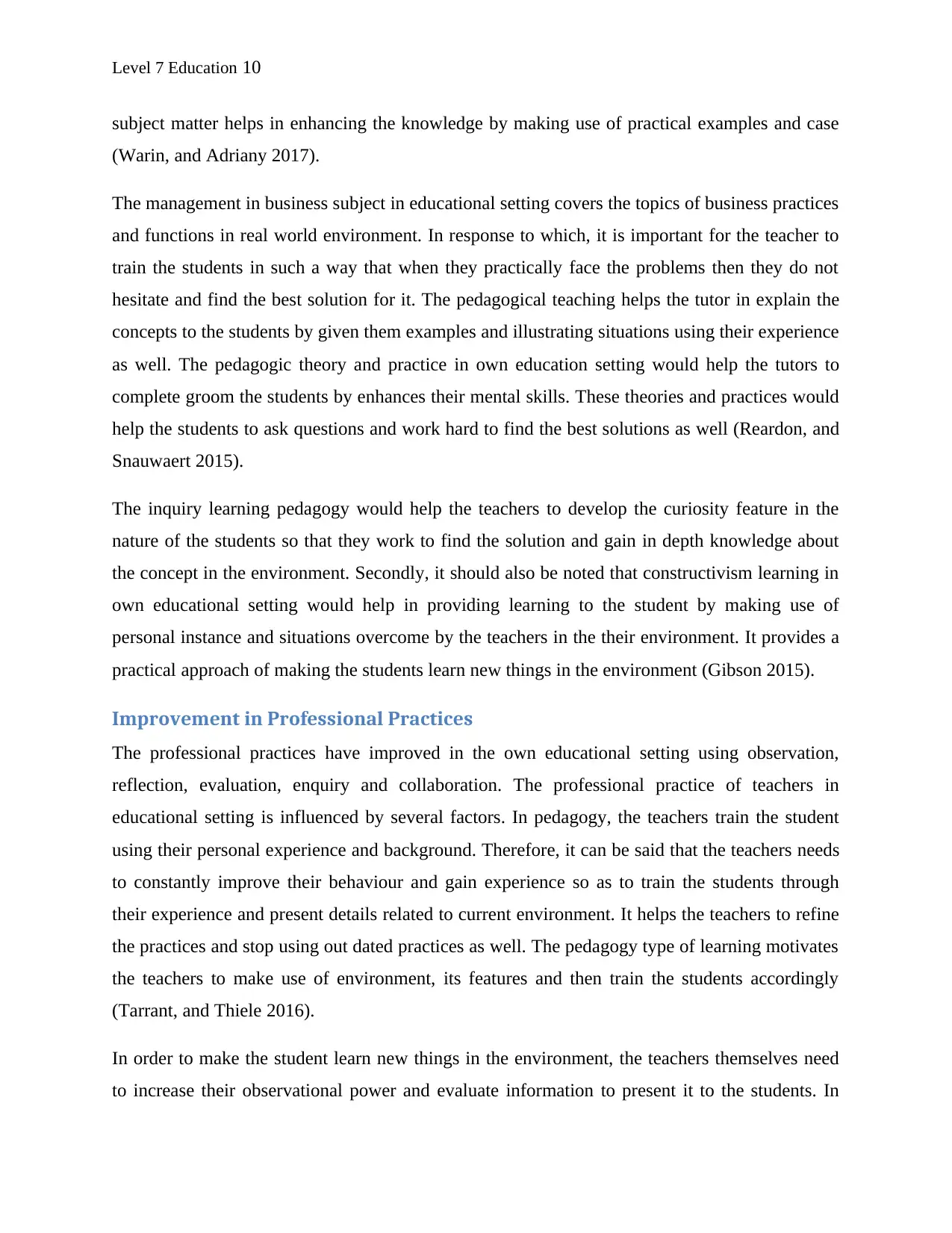
Level 7 Education 10
subject matter helps in enhancing the knowledge by making use of practical examples and case
(Warin, and Adriany 2017).
The management in business subject in educational setting covers the topics of business practices
and functions in real world environment. In response to which, it is important for the teacher to
train the students in such a way that when they practically face the problems then they do not
hesitate and find the best solution for it. The pedagogical teaching helps the tutor in explain the
concepts to the students by given them examples and illustrating situations using their experience
as well. The pedagogic theory and practice in own education setting would help the tutors to
complete groom the students by enhances their mental skills. These theories and practices would
help the students to ask questions and work hard to find the best solutions as well (Reardon, and
Snauwaert 2015).
The inquiry learning pedagogy would help the teachers to develop the curiosity feature in the
nature of the students so that they work to find the solution and gain in depth knowledge about
the concept in the environment. Secondly, it should also be noted that constructivism learning in
own educational setting would help in providing learning to the student by making use of
personal instance and situations overcome by the teachers in the their environment. It provides a
practical approach of making the students learn new things in the environment (Gibson 2015).
Improvement in Professional Practices
The professional practices have improved in the own educational setting using observation,
reflection, evaluation, enquiry and collaboration. The professional practice of teachers in
educational setting is influenced by several factors. In pedagogy, the teachers train the student
using their personal experience and background. Therefore, it can be said that the teachers needs
to constantly improve their behaviour and gain experience so as to train the students through
their experience and present details related to current environment. It helps the teachers to refine
the practices and stop using out dated practices as well. The pedagogy type of learning motivates
the teachers to make use of environment, its features and then train the students accordingly
(Tarrant, and Thiele 2016).
In order to make the student learn new things in the environment, the teachers themselves need
to increase their observational power and evaluate information to present it to the students. In
subject matter helps in enhancing the knowledge by making use of practical examples and case
(Warin, and Adriany 2017).
The management in business subject in educational setting covers the topics of business practices
and functions in real world environment. In response to which, it is important for the teacher to
train the students in such a way that when they practically face the problems then they do not
hesitate and find the best solution for it. The pedagogical teaching helps the tutor in explain the
concepts to the students by given them examples and illustrating situations using their experience
as well. The pedagogic theory and practice in own education setting would help the tutors to
complete groom the students by enhances their mental skills. These theories and practices would
help the students to ask questions and work hard to find the best solutions as well (Reardon, and
Snauwaert 2015).
The inquiry learning pedagogy would help the teachers to develop the curiosity feature in the
nature of the students so that they work to find the solution and gain in depth knowledge about
the concept in the environment. Secondly, it should also be noted that constructivism learning in
own educational setting would help in providing learning to the student by making use of
personal instance and situations overcome by the teachers in the their environment. It provides a
practical approach of making the students learn new things in the environment (Gibson 2015).
Improvement in Professional Practices
The professional practices have improved in the own educational setting using observation,
reflection, evaluation, enquiry and collaboration. The professional practice of teachers in
educational setting is influenced by several factors. In pedagogy, the teachers train the student
using their personal experience and background. Therefore, it can be said that the teachers needs
to constantly improve their behaviour and gain experience so as to train the students through
their experience and present details related to current environment. It helps the teachers to refine
the practices and stop using out dated practices as well. The pedagogy type of learning motivates
the teachers to make use of environment, its features and then train the students accordingly
(Tarrant, and Thiele 2016).
In order to make the student learn new things in the environment, the teachers themselves need
to increase their observational power and evaluate information to present it to the students. In
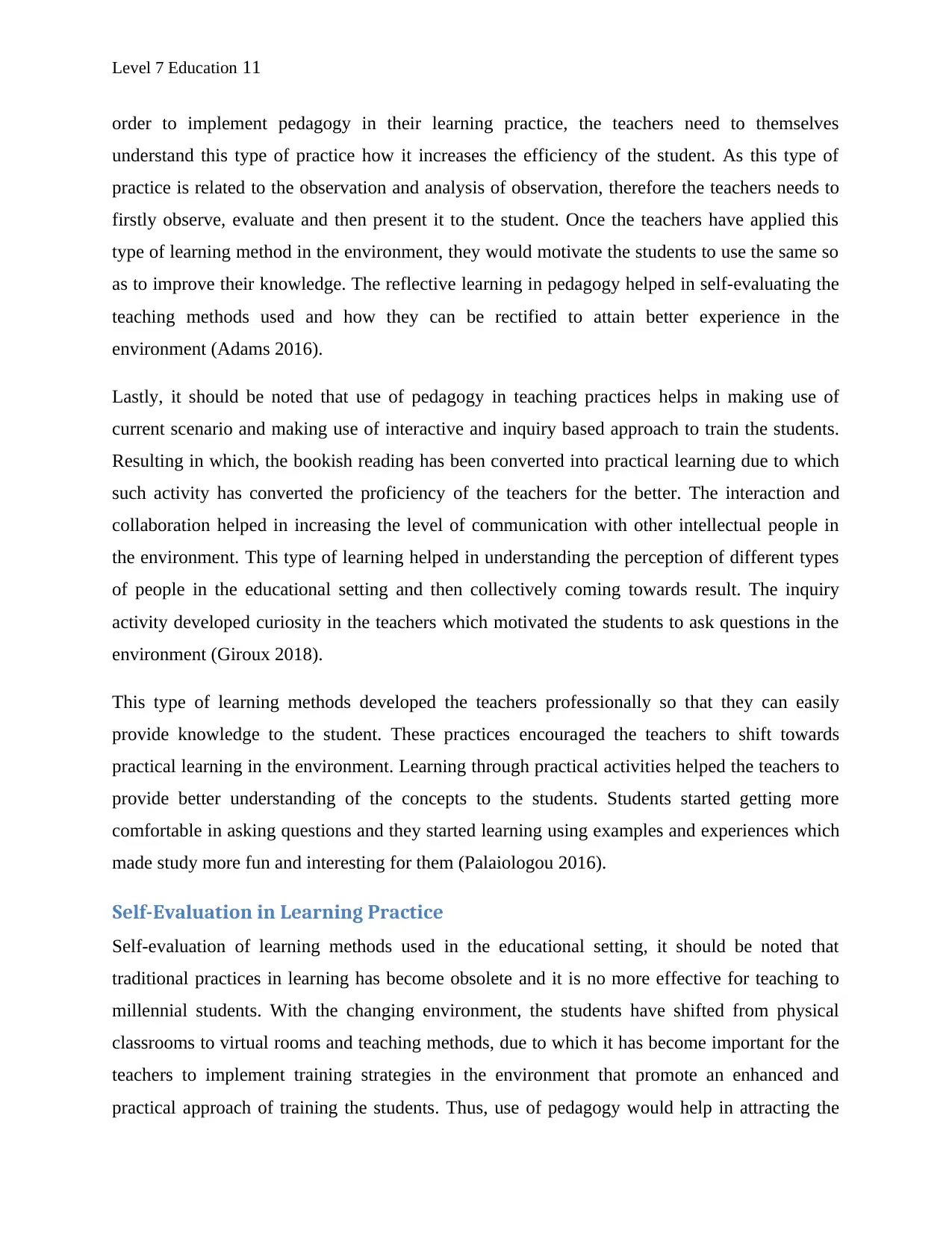
Level 7 Education 11
order to implement pedagogy in their learning practice, the teachers need to themselves
understand this type of practice how it increases the efficiency of the student. As this type of
practice is related to the observation and analysis of observation, therefore the teachers needs to
firstly observe, evaluate and then present it to the student. Once the teachers have applied this
type of learning method in the environment, they would motivate the students to use the same so
as to improve their knowledge. The reflective learning in pedagogy helped in self-evaluating the
teaching methods used and how they can be rectified to attain better experience in the
environment (Adams 2016).
Lastly, it should be noted that use of pedagogy in teaching practices helps in making use of
current scenario and making use of interactive and inquiry based approach to train the students.
Resulting in which, the bookish reading has been converted into practical learning due to which
such activity has converted the proficiency of the teachers for the better. The interaction and
collaboration helped in increasing the level of communication with other intellectual people in
the environment. This type of learning helped in understanding the perception of different types
of people in the educational setting and then collectively coming towards result. The inquiry
activity developed curiosity in the teachers which motivated the students to ask questions in the
environment (Giroux 2018).
This type of learning methods developed the teachers professionally so that they can easily
provide knowledge to the student. These practices encouraged the teachers to shift towards
practical learning in the environment. Learning through practical activities helped the teachers to
provide better understanding of the concepts to the students. Students started getting more
comfortable in asking questions and they started learning using examples and experiences which
made study more fun and interesting for them (Palaiologou 2016).
Self-Evaluation in Learning Practice
Self-evaluation of learning methods used in the educational setting, it should be noted that
traditional practices in learning has become obsolete and it is no more effective for teaching to
millennial students. With the changing environment, the students have shifted from physical
classrooms to virtual rooms and teaching methods, due to which it has become important for the
teachers to implement training strategies in the environment that promote an enhanced and
practical approach of training the students. Thus, use of pedagogy would help in attracting the
order to implement pedagogy in their learning practice, the teachers need to themselves
understand this type of practice how it increases the efficiency of the student. As this type of
practice is related to the observation and analysis of observation, therefore the teachers needs to
firstly observe, evaluate and then present it to the student. Once the teachers have applied this
type of learning method in the environment, they would motivate the students to use the same so
as to improve their knowledge. The reflective learning in pedagogy helped in self-evaluating the
teaching methods used and how they can be rectified to attain better experience in the
environment (Adams 2016).
Lastly, it should be noted that use of pedagogy in teaching practices helps in making use of
current scenario and making use of interactive and inquiry based approach to train the students.
Resulting in which, the bookish reading has been converted into practical learning due to which
such activity has converted the proficiency of the teachers for the better. The interaction and
collaboration helped in increasing the level of communication with other intellectual people in
the environment. This type of learning helped in understanding the perception of different types
of people in the educational setting and then collectively coming towards result. The inquiry
activity developed curiosity in the teachers which motivated the students to ask questions in the
environment (Giroux 2018).
This type of learning methods developed the teachers professionally so that they can easily
provide knowledge to the student. These practices encouraged the teachers to shift towards
practical learning in the environment. Learning through practical activities helped the teachers to
provide better understanding of the concepts to the students. Students started getting more
comfortable in asking questions and they started learning using examples and experiences which
made study more fun and interesting for them (Palaiologou 2016).
Self-Evaluation in Learning Practice
Self-evaluation of learning methods used in the educational setting, it should be noted that
traditional practices in learning has become obsolete and it is no more effective for teaching to
millennial students. With the changing environment, the students have shifted from physical
classrooms to virtual rooms and teaching methods, due to which it has become important for the
teachers to implement training strategies in the environment that promote an enhanced and
practical approach of training the students. Thus, use of pedagogy would help in attracting the
⊘ This is a preview!⊘
Do you want full access?
Subscribe today to unlock all pages.

Trusted by 1+ million students worldwide
1 out of 17
Related Documents
Your All-in-One AI-Powered Toolkit for Academic Success.
+13062052269
info@desklib.com
Available 24*7 on WhatsApp / Email
![[object Object]](/_next/static/media/star-bottom.7253800d.svg)
Unlock your academic potential
Copyright © 2020–2026 A2Z Services. All Rights Reserved. Developed and managed by ZUCOL.





